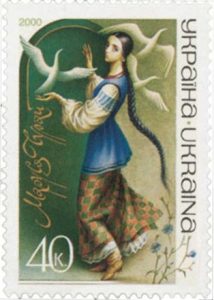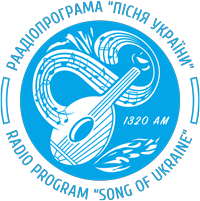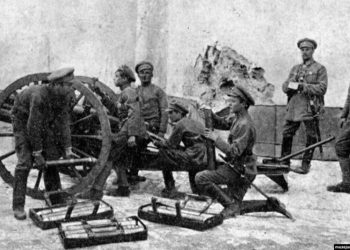She never lived. But Marusia Churai’s songs have survived empire, silence, and war — carrying the memory of a nation, and the women it tried to forget.
By Bohdan Cherniawski | July 9, 2025
Marusia Churai is one of the most iconic figures in Ukrainian cultural memory — and one of its most paradoxical. Said to be a gifted 17th-century poet and songwriter from Poltava, Marusia is remembered for her sorrowful lyrics, her tragic love story, and her supposed trial for poisoning the man who betrayed her. Her songs are sung to this day, and her story has been immortalized in Ukrainian literature, most notably in Lina Kostenko’s 1979 novel-in-verse Marusia Churai.
And yet, Marusia Churai almost certainly never existed. There are no records of her life, no firsthand accounts of her poetry, and no documents confirming the dramatic trial that folklore assigns to her legend. She is a fictional figure — shaped by oral tradition, romantic nationalism, and modern literary reimagination. But fiction does not mean falsehood. In the case of Marusia Churai, fiction means truth of a different kind: emotional, cultural, poetic. She is a symbol of the female voice long excluded from historical authorship, and a mirror of Ukraine’s soul, singing through centuries of struggle and beauty.
A Name for a Silence
Marusia’s story begins not in archives, but in song. Folk ballads like “Oi, ne khody, Hrytsiu,” “Za svit vstaly kozachenky,” and “Viyut’ vitry” circulated through oral tradition, passed from voice to voice, reshaped with each generation. Haunting and lyrical, they express longing, betrayal, departure — themes often voiced by women. But their authors are unknown.
By the 18th or 19th century, Ukrainian culture began to assign these songs to a single figure: Marusia Churai. She was said to be the daughter of a Cossack from Poltava, who poisoned her lover after betrayal and was sentenced to death, only to be pardoned by Hetman Bohdan Khmelnytsky. None of this can be confirmed by historical record.
Still, the power of her myth lies not in fact, but in symbolic truth. Naming her gave voice to the thousands of women behind anonymous songs. In a tradition where female authorship was nearly invisible, Marusia became the imagined author of the unclaimed.
She was fiction, but she filled a void history left behind.
The Poet Who Gave Her Flesh
In 1979, Lina Kostenko gave Marusia form and depth. Her novel-in-verse Marusia Churai reimagined the legend through the lens of lyricism, psychology, and national memory. Set during the Khmelnytsky Uprising, the story turns Marusia into a poet whose songs speak not only of personal loss, but of a nation’s pain.
Kostenko’s Marusia is fictional, but grounded in historical reality. Real events, real cities, and real figures like Khmelnytsky move through the pages. Her heroine becomes a voice of conscience, a thinker, a creator, and a witness. Writing in Ukrainian under Soviet censorship, Kostenko gave that voice a moral weight. One line became immortal:
“This girl is not just Marusia. She is our voice. She is our song. She is our soul.”
But over time, the complexity Kostenko crafted began to blur into reverence. The myth hardened. The voice risked becoming a statue.
The Risk of Reverence
 Yet in modern Ukraine, Marusia’s myth has not only survived — it has adapted. What once symbolized sorrow now fuels endurance. Her songs are heard in trench shelters, her story echoed at memorials. She doesn’t haunt the past. She moves through the present.
Yet in modern Ukraine, Marusia’s myth has not only survived — it has adapted. What once symbolized sorrow now fuels endurance. Her songs are heard in trench shelters, her story echoed at memorials. She doesn’t haunt the past. She moves through the present.
A young medic writes new verses in a field notebook. A drone technician hums “Viyut’ vitry” between missions. A grieving mother quotes Kostenko beside her daughter’s grave. These are not acts of nostalgia. They are moments of resistance. Myth and reality have joined forces. Marusia no longer speaks alone. She walks beside those who now carry the burden she once symbolized. She doesn’t silence real women. She amplifies them.
The myth lives — not to replace truth, but to serve it. In doing so, Marusia has become something more than a symbol.
She is a weapon of memory.
Wartime Memory, Real Names
Since the 2022 invasion, Marusia’s presence has returned. Not just in song, but in headlines, murals, and military funerals. In April 2023, singer Marta Dobrovolska performed “Viyut’ vitry” in a Lviv church packed with the families of the fallen. Before she sang, she said only:
“This is for the women who stayed loud.”
Afterward, she told a reporter:
“We keep singing Marusia’s songs. But now we know who sings them. And why.”
That moment belonged not to legend, but to the living. Today, Ukraine no longer needs invented names to fill its silence. It has real ones — poets, medics, mothers, drone pilots, defenders. Women who do not borrow voices. They use their own. Marusia still matters. But not because we need her to speak for others. Because she reminds us how long others had to go unheard.
The Echo That Became a Chorus
Marusia Churai was never real. But the silence she answered was.
She was imagined because memory needed a voice. Because women who wrote, grieved, and created were too often unnamed. Through her, a nation whispered what history wouldn’t say aloud.
But that time has passed.
Today, the silence is broken not by myth, but by living voices — women who fight, write, mourn, lead. Their names are known. Their words are their own. And they do not echo from the past. They shape the present.
Marusia’s song endures — not because she must speak for others, but because she reminds us how long they weren’t allowed to speak at all.
Now, they speak with voices that are wholly their own.
And the country listens.
About the Author
Bohdan Cherniawski is a military veteran, historian, and writer focused on Eastern European political history, intelligence, and global health in conflict zones.







